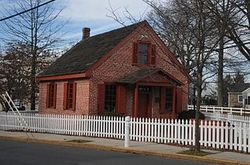-- Education - Overview of K-12 System
** Home
|
 Re-creation of school in Bordentown founded in 1852 as one of the first free public schools in New Jersey by Clara Barton, later a Civil War nurse and founder of the American Red Cross. Image: National Park Service Re-creation of school in Bordentown founded in 1852 as one of the first free public schools in New Jersey by Clara Barton, later a Civil War nurse and founder of the American Red Cross. Image: National Park Service
--Overview of Current System There are over 1.2 million students enrolled in kindergarten through 12th grade public schools in New Jersey. In 2021, New Jersey's high school statewide graduation rate was 90.9%, an all-time high which had steadily advanced since the 2011 rate of 83%. The state's public school system ranks as the tenth largest among the 50 states, according to PublicSchoolReview.com.
In the 2020-21 school year, statewide total spending per pupil was $24,543, a total comprising all district expenditures, including tuition payments for students sent out of district, lunch programs covered by student fees, transportation for public and nonpublic students, and pension payments made by the state on behalf of school districts. The average budgetary cost per New Jersey student totaled $18,208 in the 2021-22 school year--an increase of $1,385 (8.2% from the 2020-21 school year. New Jersey teacher salaries, which averaged $77,489 in the 2020-21 school year, rank 7th highest among the top 10 states and the District of Columbia, according to the National Center for Education. The national average for teacher salaries was $65,090, when adjusted for inflation, according to the Center. The average teacher pay in New Jersey ranked behind:
--New Jersey Department of Education
The New Jersey Department of Education is headed by a commissioner appointed by the governor subject to confirmation by the state Senate. The commissioner works with the State Board of Education, a thirteen-member citizen board appointed by the governor which approves educational policies proposed by the commissioner, confirms his or her appointees, and hears appeals of the commissioner’s decisions on disputes arising from school law. Its members are appointed to six-year terms and serve without compensation. The Department is responsible for ensuring that local schools comply with state and federal laws and regulations. It also oversees pupil transportation services and directs education programs for adults and for persons who are handicapped, disadvantaged or foreign-born. For the fiscal 2022-2023 year which ends on June 30, 2023, the Department's budget is $107 million, with an additional $9.9 billion allocated for state aid to local school districts. * New Jersey Department of Education * Data and Reports, New Jersey Department of Education * Taxpayers' Guide to Education Spending 2022, New Jersey Department of Education -- Comparative student and school performance The Department of Education publishes a diverse range of data and reports on the state's schools and student performance. In October 2015, the state released the initial results of student testing on the new exams administered as part of the Partnership for Assessment of Readiness for College and Careers (PARCC) program. The results showed that less than half of the students taking the exam met the benchmarks for their grade levels in math and English. Overall, however, the state appeared to be in line with the testing results of other states for readiness for the next grade or college. In fulfillment of a campaign pledge, after taking office in January 2018 Governor Murphy announced that the state would be phasing out the PARCC testing program to shift to other performance measures. Perhaps of most interest to parents and taxpayers are the New Jersey School Performance Reports, which provide data to compare individual schools in school finance, school staff, student behavior, and student achievement. In addition to comparative data published by the state, private sector publishers also provide rankings of schools based on their own criteria. The include US News and World Report; Niche.com; PublicSchoolReview.com and New Jersey Monthly. New Jersey also has some of the nation's most prominent private schools. In its most recent ranking published for 2023, Niche.com ranked the top private high schools in the state as the Princeton International School of Math and Science; the Lawrenceville School in Lawrence Township; the Pingry School in Martinsville; the Newark Academy; and the Delbarton School in Morristown. * PARCC Assessments, New Jersey Department of Education * New Jersey School Performance, New Jersey Department of Education * New Jersey Public Schools, PublicSchoolReview.com * Taxpayer's Guide to Education Spending, New Jersey Department of Education/NJ Spotlight * School Performance Reports 101: What You Need to Know to Decode the Data, NJ Spotlight * 2023 Best Schools in New Jersey, Niche.com * 2023 Best Private High Schools in New Jersey, Niche.com |